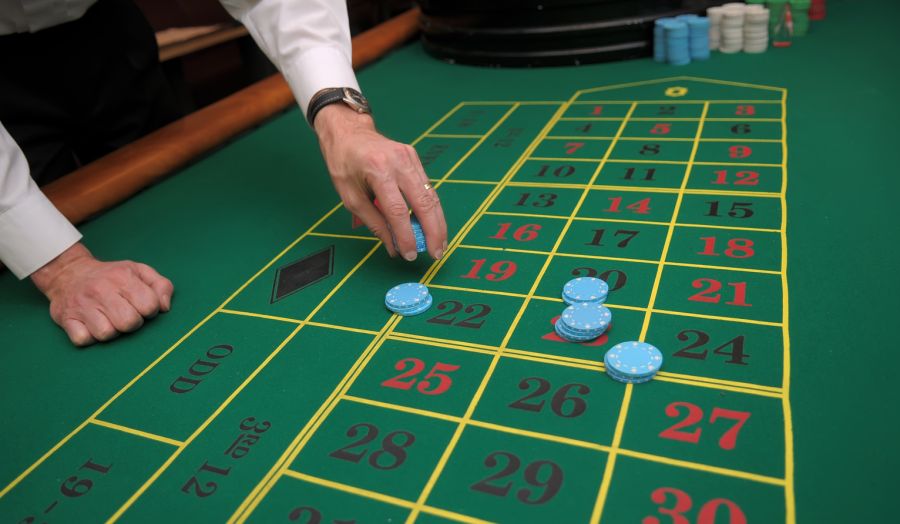Effective Roulette Strategies: Improve Your Odds
Effective Roulette Strategies: Improve Your Odds
Roulette, a captivating casino game that has stood the test of time, continues to enthral players worldwide. With its origins dating back to 18th century France, roulette has since gained immense popularity and become a staple in both land-based and online casinos. The game's allure lies in its simplicity, as players place bets on where a small ball will land on a spinning wheel divided into numbered pockets.
However, roulette is not merely a game of chance; strategic thinking can significantly improve your odds of success. In this article, we will explore effective roulette strategies that can enhance your gameplay and potentially increase your winnings.
Understanding the importance of strategy in roulette is essential. While luck certainly plays a role, implementing a well-thought-out approach can help you make informed decisions and maximise your winning potential. By utilising strategies tailored to different betting options, you can optimise your bets and minimise the house edge.
Whether you are a seasoned roulette enthusiast or a novice looking to enhance your skills, this strategy guide will take you through various effective strategies that can improve your odds. From betting systems to bankroll management, we will delve into proven tips and tricks to elevate your roulette game.

Understanding Roulette Basics
To effectively employ roulette strategies and improve your odds, it's crucial to have a solid understanding of the game's fundamentals, which we will look at here.
Rules of the game
Roulette follows a relatively straightforward set of rules. Players place bets on a roulette table, which features numbers 0-36 (or 0-37 in some variations). A small ball is then spun on a numbered wheel, and players wager on which number or group of numbers the ball will land on. The bets are placed before the ball is spun, and once it settles in a pocket, the winning bets are determined.
The roulette wheel: American and European versions
There are two primary variations of the roulette wheel: American and European. The American wheel features 38 pockets, including numbers 1-36, a single zero (0), and a double zero (00). In contrast, the European wheel has 37 pockets, with numbers 1-36 and a single zero (0). It's important to note that the presence of the double zero in the American version increases the house edge slightly compared to the European wheel.
Betting options and payout ratios
Roulette offers a diverse range of betting options, providing players with flexibility in their strategies. Here are some common bets:
Inside bets: These are bets placed on specific numbers or small groups of numbers. Examples include straight bets (betting on a single number), split bets (betting on two adjacent numbers), and corner bets (betting on four numbers that form a square on the table). Payout ratios for inside bets are higher because they carry higher odds.
Outside bets: These bets involve larger groups of numbers. Examples include red or black (betting on the colour of the winning number), odd or even (betting on whether the winning number will be odd or even), and dozen bets (betting on a group of 12 numbers). Outside bets have lower payout ratios but offer higher chances of winning.
Mathematical Background of Roulette
The house edge refers to the advantage that the casino has over players in any given casino game. In roulette, it is primarily determined by the presence of the zero(s) on the wheel. The presence of the zero(s) creates a slight disparity between the true odds of winning and the payout ratios offered by the casino, giving the house an edge. It's crucial to understand that while strategies can help improve your odds, the house edge ensures that, in the long run, the casino will profit.
Probability theory plays a vital role in understanding the dynamics of roulette. Each number on the wheel has a specific probability of being the winning number on any given spin. For example, on a European wheel with 37 pockets, the probability of the ball landing on any individual number is 1 in 37. By calculating and analysing the probabilities associated with different bets, players can make informed decisions regarding their wagers.
The presence of the zero (and double zero in the American version) has a significant impact on the game and the odds of winning. When the ball lands on the zero(s), all bets except those specifically placed on the zero(s) lose. This creates a distinct advantage for the casino, as it effectively provides a house edge.
Fundamental Roulette Strategies
1. Martingale Strategy
The Martingale Strategy is one of the most popular and straightforward betting systems in roulette. The concept is based on doubling your bet after every loss, with the aim of recovering your previous losses and making a profit when you eventually win.
To apply the Martingale Strategy, start by placing a bet on an even-money option (e.g., red or black, odd or even). If you lose, double your bet on the same option for the next spin. Repeat this process until you win, at which point you revert to your original bet size.
Pros:
- The Martingale Strategy can be effective in recouping losses quickly if you have a sufficient bankroll.
- It works best with even-money bets, where the odds of winning are close to 50%.
Cons:
- The strategy requires a large bankroll to withstand potential losing streaks.
- Casinos often impose table limits, which can prevent you from doubling your bets indefinitely.
- A long losing streak can result in significant financial losses.
2. Reverse Martingale Strategy
The Reverse Martingale Strategy, also known as the Paroli system, takes the opposite approach of the Martingale Strategy. Instead of doubling your bet after a loss, you double it after a win, aiming to maximise profits during winning streaks.
Begin by placing a bet on an even-money option, and if you win, double your bet for the next spin. Repeat this process as long as you continue to win, and then revert to your original bet size after a loss.
Pros:
- The Reverse Martingale Strategy allows you to capitalise on winning streaks and increase your profits.
- It can be psychologically satisfying and help manage your bankroll effectively.
Cons:
- Winning streaks are unpredictable, and a loss can quickly erase your accumulated profits.
- It is crucial to know when to stop and revert to your original bet size, as chasing further wins can be risky.
3. D'Alembert Strategy
The D'Alembert Strategy is a more conservative approach to roulette betting. It involves adjusting your bet size by a predetermined amount after each win or loss, aiming for smaller, incremental gains.
Start by choosing a base unit for your bet, and after each loss, increase your bet size by the base unit. Conversely, after each win, decrease your bet size by the same amount.
Pros:
- The D Alembert Strategy provides a more gradual approach to betting, reducing the risk of large losses.
- It can be suitable for players who prefer a balanced and steady betting progression.
Cons:
- The strategy does not guarantee consistent profits, as wins and losses can occur randomly.
- It may take longer to recover losses compared to more aggressive betting systems.
4. Fibonacci Strategy
The Fibonacci Strategy is based on the Fibonacci sequence, where each number is the sum of the two preceding numbers (e.g., 1, 1, 2, 3, 5, 8, 13, and so on). In roulette, it involves adjusting your bet size based on the Fibonacci sequence.
Begin by placing a bet equal to the first number in the Fibonacci sequence. After a loss, move one step forward in the sequence and bet that amount. After a win, move two steps back in the sequence. Repeat this process until you achieve a desired profit or reach the end of the sequence.
Pros:
- The Fibonacci Strategy offers a structured and systematic approach to betting.
- It provides a balance between conservative betting and the potential for moderate profits.
Cons:
- Like other progressive betting systems, a losing streak can lead to substantial losses.
- The strategy does not alter the odds of winning, as they are determined by the game itself.
5. James Bond Strategy
The James Bond Strategy is a unique betting system named after the famous fictional spy character. It involves placing specific bets that cover a wide range of numbers on the roulette table.
The James Bond Roulette Strategy requires a larger bankroll. It requires players to place a bet of $14 on the numbers 19-36, a $5 bet on the number 13-18, and a $1 bet on the zero (0). This strategy covers a significant portion of the wheel and offers multiple ways to win.
Pros:
- The James Bond Strategy provides a combination of potential wins on both high and low numbers.
- It offers an element of excitement and can be suitable for players seeking a more diversified betting approach.
Cons:
- This strategy does not eliminate the house edge, and winning is still based on chance.
- It requires a specific minimum bet size and may not be suitable for all budgets.
Advanced Roulette Strategies
1. Labouchère System
The Labouchère System, also known as the Cancellation System or Split Martingale, is a progressive betting strategy that aims to recover losses and achieve a predetermined profit target.
Start by determining your desired profit target. Then, create a sequence of numbers that adds up to your target. Each bet will be the sum of the first and last numbers in the sequence. If the bet wins, remove these numbers from the sequence, and if the bet loses, add the amount lost to the end of the sequence. Continue this process until the entire sequence is eliminated or you reach your profit target.
Pros:
- The Labouchere Strategy offers flexibility in determining your profit target.
- It allows for customisation of the betting sequence based on personal preferences.
Cons:
- A long losing streak can result in a sequence that grows rapidly, requiring larger bets.
- It requires discipline and careful record-keeping to manage the sequence effectively.
2. Paroli System
The Paroli System, also known as the Reverse Martingale, is a positive progression betting strategy that focuses on capitalising on winning streaks.
With the Paroli Strategy, you start with a base bet and increase it after each win. For example, you may choose to double your bet after each win for a maximum of three consecutive wins. After three wins or any loss, you revert to your base bet.
Pros:
- The Paroli System allows you to maximise profits during winning streaks.
- It reduces the risk of losing accumulated profits quickly.
Cons:
- Winning streaks can be unpredictable, and it is essential to know when to stop and revert to the base bet.
- It is crucial to set realistic limits and not get carried away by extended winning streaks.
3. Cover the Table Strategy
The Cover the Table Strategy, as the name implies, involves placing bets to cover as many numbers as possible on the roulette table.
With the Cover the Table Strategy, you place bets on multiple outcomes that cover a significant portion of the table. For example, you may bet on red or black, odd or even, 1-18 or 19-36, and specific columns or dozens. The objective is to have a higher chance of winning on each spin, although the payout ratios are generally lower.
Pros:
- The Cover the Table Strategy offers a high coverage of numbers, providing more opportunities to win.
- It can be suitable for players who prefer a more cautious and conservative approach.
Cons:
- While the strategy increases the chances of winning, it also reduces potential payout ratios.
- It does not eliminate the house edge, and the overall profitability still relies on luck.
Tips for Effective Roulette Play
1. Bankroll Management
Proper bankroll management is crucial when playing roulette. Set a budget for your gambling session and determine the maximum amount you are willing to wager. Divide your bankroll into smaller units and avoid exceeding your predetermined limits. This approach ensures that you can sustain losses, manage your bets effectively, and prevent reckless gambling.
2. Choosing The Right Roulette Variant
Consider the different variants of roulette available and choose the one that best suits your preferences and goals. European roulette is generally preferred due to its lower house edge compared to the American variant. By selecting the right variant, you increase your chances of winning in the long run.
3. Understanding of Randomness and Luck
Recognize that roulette is a game of chance, and outcomes are determined by random events. No strategy or system can overcome the inherent randomness of the game. Have realistic expectations and understand that luck plays a significant role in the short term. Focus on making informed decisions based on probability and prudent betting rather than relying solely on luck.
4. The Value of Practice and Patience
Roulette, like any casino game, requires practice and patience in order to play effectively. Familiarise yourself with the rules, different betting options, and strategies through free online roulette games or low-stakes tables. Develop a solid understanding of the game mechanics and experiment with various strategies to find what works best for you. Remember that success in roulette is a long-term endeavour, and consistent practice can lead to better decision-making.
5. Knowing When to Quit
One of the most important aspects of successful gambling is knowing when to stop. Set win and loss limits before you start playing and adhere to them. Avoid chasing losses or becoming overconfident during winning streaks, as these can lead to impulsive decisions and potential losses.
Conclusion
In conclusion, effective roulette play involves a combination of strategic decision-making, understanding the role of luck, and implementing proper bankroll management. While there is no foolproof strategy to guarantee consistent wins in roulette due to the inherent randomness of the game and the presence of the house edge, employing strategic approaches can help optimise your chances of success.
By implementing fundamental strategies like the Martingale, Reverse Martingale, D'Alembert, Fibonacci, and James Bond strategies, you can approach the game with a structured betting plan. Additionally, advanced strategies like the Labouchère, Paroli, and Cover the Table strategies offer more nuanced approaches to capitalise on winning streaks and manage losses.
It is important to remember that luck plays a significant role in roulette outcomes, and the house edge ensures that the casino has a statistical advantage. However, by understanding probability, practising responsible bankroll management, and honing your skills through practice and patience, you can maximise your enjoyment of the game and potentially improve your overall results.
Frequently Asked Questions
What is the best roulette strategy?
The best roulette strategy depends on individual preferences and goals. There is no one-size-fits-all strategy, and it is recommended to explore different strategies, understand their pros and cons, and find the one that aligns with your playing style.
Can roulette be beaten with a system?
While strategic play can enhance your chances, it is important to note that roulette is a game of chance, and no system can beat the odds and guarantee consistent wins. The house edge ensures that the casino has a statistical advantage in the long run.
How does the house edge affect my odds in roulette?
The house edge in roulette represents the casino's built-in advantage. It varies depending on the roulette variant, with the European variant having a lower house edge compared to the American variant.
Why is bankroll management important in roulette?
Bankroll management is crucial to ensure responsible gambling and protect your funds. It helps you set limits, prevent excessive losses, and prolong your playing sessions. Proper bankroll management ensures that you can withstand losing streaks and make informed betting decisions.
How do advanced strategies improve my odds in roulette?
While advanced strategies don't alter the underlying payout odds, they provide structured approaches to betting, allowing for more controlled gameplay and potentially maximising profits during favourable runs.
How does understanding probability help in roulette?
It helps you assess the likelihood of specific outcomes and determine the expected value of your bets. By incorporating probability into your strategy, you can make more rational and logical choices.
Can I practise roulette strategies online for free?
Yes, many online platforms offer free roulette games that allow you to practice different strategies without risking real money.
When should I quit while playing roulette?
Knowing when to quit is vital in managing your bankroll and avoiding potential losses. Set win and loss limits before you start playing, and adhere strictly to them. If you reach your profit target or experience consecutive losses that reach your limit, end your session.








